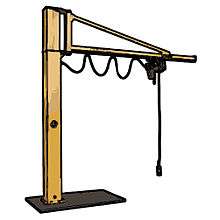jib
English
Etymology 1
Attested since the 1660s, of uncertain origin. Perhaps related to jib (“shift or swing around”) (see below).


Noun
jib (plural jibs)
Alternative forms
- jibe (archaic)
Derived terms
- cut of one’s jib
- flying jib
- genoa jib
- inner jib
- jib headed
- jib header
- jib topsail
- outer jib
- storm jib
Translations
|
|
Etymology 2
Attested since the 1680s (also spelled jibe and gybe), perhaps from Dutch gijben (a variant of gijpen (“to turn sails suddenly”), whence certainly the form jibe) or else from Danish gibbe (“jib, jibe”), related to Swedish gippa (“jib, jibe, jerk, make jump”). Compare also Middle High German gempeln (“to spring”), Swedish guppa (“to move up and down”), Swedish gumpa (“to jump, spring”). See jump.
Verb
jib (third-person singular simple present jibs, present participle jibbing, simple past and past participle jibbed)
- (chiefly nautical) To shift, or swing around, as a sail, boom, yard, etc., as in tacking.
See also
- asymmetrical spinnaker
- blooper
- deck sweeper
- drifter
- genoa
Etymology 3
Attested since the 1660s, of uncertain origin, perhaps a shortening of gibbet.
Noun
jib (plural jibs)
- The projecting arm of a crane.
- (metonymically) A crane used for mounting and moving a video camera.
- An object that is used for performing tricks while skiing, snowboarding, skateboarding, in-line skating, or biking. These objects are usually found in a terrain park or skate park.
Translations
Etymology 4
Of uncertain origin, perhaps related to jib (“shift or swing around”) (see above).
Verb
jib (third-person singular simple present jibs, present participle jibbing, simple past and past participle jibbed)
- To stop and refuse to go forward (usually of a horse).
- 1826, Benjamin Disraeli, Vivian Grey, London: Henry Colburn, 1827, Volume 4, Book 6, page 73:
- “Who calls, who calls?” cried Essper; a shout was the only answer. There was no path, but the underwood was low, and Vivian took his horse, an old forester, across it with ease. Essper’s jibbed.
- 1902, Joseph Conrad, chapter I, in Heart of Darkness:
- Then he got fever, and had to be carried in a hammock slung under a pole. As he weighed sixteen stone I had no end of rows with the carriers. They jibbed, ran away, sneaked off with their loads in the night—quite a mutiny.
- 1901, Rudyard Kipling, Kim, Chapter 2:
- The lama jibbed at the open door of a crowded third-class carriage. ‘Were it not better to walk?’ said he weakly.
- 1989, Jack Vance, Madouc, Chapter Eight:
- “Juno has a kindly gait. She neither jibs nor shies, though she will take a fence no more. […] ”
- 1826, Benjamin Disraeli, Vivian Grey, London: Henry Colburn, 1827, Volume 4, Book 6, page 73:
- (figuratively) To stop doing something, to become reluctant to proceed with an activity.
- 1819, Walter Scott, The Bride of Lammermoor, Chapter 28:
- “What say you to the young lady herself?” said Craigengelt; “the finest young woman in all Scotland, one that you used to be so fond of when she was cross, and now she consents to have you, and gives up her engagement with Ravenswood, you are for jibbing. I must say, the devil’s in ye, when ye neither know what you would have nor what you would want.”
- 1992, Hilary Mantel, A Place of Greater Safety, Harper Perennial 2007, pages 401-2:
- Some of us began to jib when the family began to collect portraits of their new son to decorate their walls [...].
- 2002, Colin Jones, The Great Nation, Penguin 2003, page 318:
- The Parlement scarcely jibbed.
- 1819, Walter Scott, The Bride of Lammermoor, Chapter 28:
Translations
Noun
jib (plural jibs)
- One who jibs or balks, refusing to continue forward.
- A stationary condition; a standstill.
Etymology 5
Etymology 6
Noun
jib (plural jibs)
- (slang, especially African American Vernacular) The mouth, sometimes particularly the tongue, underlip, or tooth.
- (Can we add an example for this sense?)
References
- Cassell's Dictionary of Slang (2005)
Irish
Declension
Second declension
|
Bare forms
|
Forms with the definite article
|
Synonyms
- éadach cinn m
- seol cinn m
References
- "jib" in Foclóir Gaeilge-Béarla, An Gúm, 1977, by Niall Ó Dónaill.